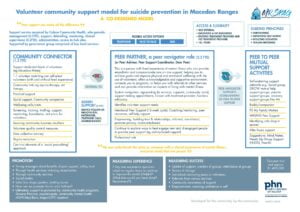Larter supported MRSPAG to develop a volunteer community support model to provide an innovative approach to mental health support.
Macedon Ranges Suicide Prevention Action Group
MRSPAG identified a need for improved services and supports for people living with mental illness. Supported by the Macedon Ranges Suicide Prevention Trial Site, MRSPAG engaged Larter to undertake a rapid scoping, feasibility and co-design project to develop a potential model for volunteer community support.
North Western Melbourne Primary Health Network funded this co-design project through the Macedon Ranges Place-Based Suicide Prevention Trial Site.
What is a community support model?
For people living with mental illness or poor mental health, there can sometimes be a lack of ‘non-medical’ or community support available. This might be social, emotional or practical support, and can include peer support. For example:
- People might be looking for a safe and friendly chat with a person who has a shared experience of mental health (a peer) – someone to talk to, someone who will listen in a non-judgmental way. This might be a weekly ‘coffee and conversation’ group that meets locally or it could be one-on-one conversations
- People having difficulties coping or feeling unwell might need some practical help with day-to-day activities, such as meals or gardening or walking the dog
- Some people might need assistance in making appointments or getting to appointments
- Some people might need some support to make community connections or join activity groups and might appreciate a friendly companion to attend the library or community centre or men’s shed (or other group) with them
- When people are in crisis, or following a hospitalisation, they might want a safe and supportive peer to talk to who can listen and value them; other people might need some practical support if they need to be hospitalised (for example, accessing some pet-sitting during their hospital stay or completing some garden maintenance).
Challenge
Larter was engaged to:
- Identify options for the delivery of a volunteer community support model for suicide prevention in the Macedon Ranges
- Design a working model for the preferred option to operate in the local context, with an assessment of health and safety risks, and a business case
- Work meaningfully and appropriately with people with lived experience of suicide (bereaved people, people at risk of harm) to undertake a robust process of co-design to identify local needs and develop an appropriate local community response to better support people at risk of suicide and prevent suicide in Macedon Ranges community.
Our response
Between December 2019 and March 2020, Larter worked with MRSPAG and the Macedon Ranges community, and in particular with people with lived experience of mental illness and/or suicidal thoughts, to develop a model that could be trialled. Larter used processes of consultation and co-design, which included:
- Lived Experience Project Advisors who provided advice and review at key design and decision-making phases of the project
- Conversations and interviews with people with lived experience
- Local support needs survey
- Interviews with local services, organisations and other stakeholders
- Interviews with relevant support models being implemented elsewhere
- Co-design workshops with local people with lived experience to determine the final model.
The outcome
The recommended model draws on the strengths of peer-led approaches and ‘community prescribing’ (or ‘social prescribing’)[1] to provide an innovative approach to mental health support, that encourages whole-of-community ownership of improved mental health. The model provides a strong opportunity to address the social determinants of mental health, by improving drivers such as social connection, meaningful activity, physical health and food security.
Recommended volunteer community support model for Macedon Ranges
The key recommended components of the model include:
- A local peer partner position
- The peer partner / navigator will have lived experience of mental illness and provide empathetic and compassionate one-on-one support and information on aspects of living with mental illness (including self-help resources). The peer navigator can connect people to programs or services, and provide information about what is available in the local community, including linking people with local volunteers to meet practical and social needs.
- Community connector and volunteer service
- This service will either provide connection to community activities and/or provide 1-1 matching with a community volunteer or community companion to meet practical or social support needs.
- Peer-to-peer mutual support activities (for example, social groups or friendships).
More information is available through MRSPAG.
Larter acknowledges the significant contributions made by local people with lived experience, which includes individuals, families, carers and people bereaved, to the development of this model. Their honesty, generosity and insights contributed directly to the recommendations for the model and for funding bodies.
Larter works alongside people with lived experience of mental illness and psychological distress to design, implement and evaluate mental health services and supports.
Contact us today to discuss your co-design, commissioning or evaluation needs.
If you need help
Contact Lifeline:
- Telephone 13 11 14
- Webchat (7pm-midnight)
- SMS text service on 0477 13 11 14 (6pm-midnight)
[1] See Royal Australian College of General Practitioners and Consumers Health Forum of Australia for discussion of social prescribing for mental health in Australia chf.org.au/sites/default/files/social_prescribing_roundable_report_chf_racgp_v11.pdf

